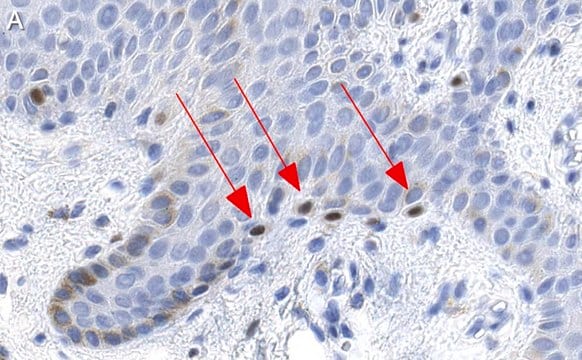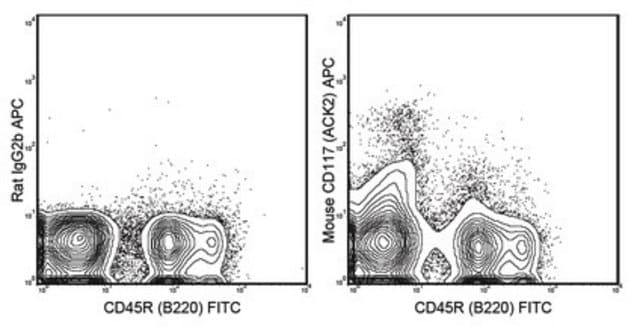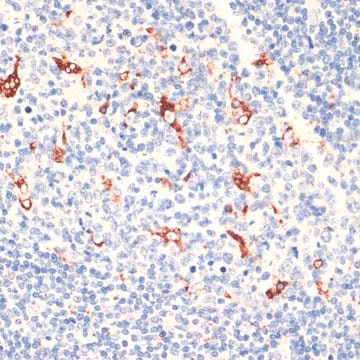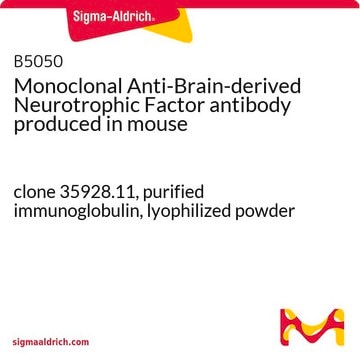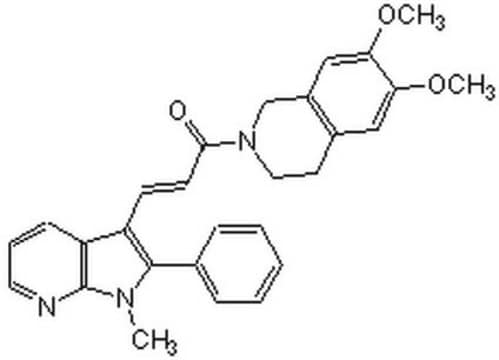General description
We are committed to bringing you greener alternative products, which adhere to one or more of The 12 Principles of Green Chemistry.This antibody is Preservative-free, produced without the harm or sacrifice of animals and exceptionally stable to allow for ambient shipping and storage if needed and thus aligns with "Waste Prevention", "Designing Safer Chemicals" and "Design for Energy Efficiency".
Click here for more information.
ZooMAb® antibodies represent an entirely new generation of recombinant monoclonal antibodies. Each ZooMAb® antibody is manufactured using our proprietary recombinant expression system, purified to homogeneity, and precisely dispensed to produce robust and highly reproducible lot-to-lot consistency. Only top-performing clones are released for use by researchers. Each antibody is validated for high specificity and affinity across multiple applications, including its most commonly used application. ZooMAb® antibodies are reliably available and ready to ship when you need them.
Specificity
Clone 1C22 is a ZooMAb® rabbit recombinant monoclonal antibody that specifically detects Emerin. It targets an epitope within 24 amino acids from the N-terminal half.
Immunogen
KLH-conjugated linear peptide corresponding to 24 amino acids from the N-terminal half of human Emerin.
Application
Quality Control Testing
Evaluated by Western Blotting in PC12 cell lysate.
Western Blotting Analysis: A 1:1,000 dilution of this antibody detected Emerin in PC12 cell lysate.
Tested Applications
Western Blotting Analysis: A 1:1,000 dilution from a representative lot detected Emerin in C2C12 and A431 cell lysates.
Affinity Binding Assay: A representative lot of this antibody bound Emerin peptide with a KD of 1.0 x 10-12 in affinity binding assay.
Immunocytochemistry Analysis: A 1:100 dilution from a representative lot detected Emerin in A431 cells.
Immunohistochemistry (Paraffin) Analysis: A 1:100 dilution from a representative lot detected Emerin in Human fallopian tube and Human thyroid tissue sections.
Note: Actual optimal working dilutions must be determined by end user as specimens, and experimental conditions may vary with the end user.
Target description
Emerin (UniProt: P50402; also known as EMD) is encoded by the EMD (also known as EDMD, STA) gene (Gene ID: 2010) in human. Emerin is a single-pass, serine-rich inner nuclear membrane (INM) protein with a single transmembrane domain (aa 223-243). Its expression is observed in skeletal muscle, heart, colon, testis, ovary, and pancreas. It mediates membrane anchorage to the cytoskeleton. It is reported to diffuse freely through the nuclear pore complex (NPC) and is enriched at the INM by virtue of its affinity to lamin A. Its selective, vesicular transport-mediated turnover is potentiated by ER stress, and it is rapidly cleared from the INM by a mechanism that requires its LEM domain (aa 1-45). It can undergo both proteasomal-dependent and lysosomal-dependent degradation. Misfolded and normally folded variants of emerin are selectively exported from the INM and ER during acute ER stress by vesicular transport through the secretory pathway and delivered to the lysosome. Emerin is shown t
Physical form
Purified recombinant rabbit monoclonal antibody IgG, lyophilized in PBS, 5% Trehalose, normal appearance a coarse or translucent resin. The PBS/trehalose components in the ZooMAb formulation can have the appearance of a semi-solid (bead like gel) after lyophilization. This is a normal phenomenon. Please follow the recommended reconstitution procedure in the data sheet to dissolve the semi-solid, bead-like, gel-appearing material. The resulting antibody solution is completely stable and functional as proven by full functional testing. Contains no biocide or preservatives, such as azide, or any animal by-products. Larger pack sizes provided as multiples of 25 µL.
Reconstitution
30 µg/mL after reconstitution at 25 µL per vial. Please refer to guidance on suggested starting dilutions and/or titers per application and sample type.
Storage and Stability
Recommend storage of lyophilized product at 2-8°C; Before reconstitution, micro-centrifuge vials briefly to spin down material to bottom of the vial; Reconstitute each vial by adding 25 µL of filtered lab grade water or PBS; Reconstituted antibodies can be stored at 2-8°C, or -20°C for long term storage. Avoid repeated freeze-thaws.
Legal Information
ZooMAb is a registered trademark of Merck KGaA, Darmstadt, Germany
Disclaimer
Unless otherwise stated in our catalog or other company documentation accompanying the product(s), our products are intended for research use only and are not to be used for any other purpose, which includes but is not limited to, unauthorized commercial uses, in vitro diagnostic uses, ex vivo or in vivo therapeutic uses or any type of consumption or application to humans or animals.


